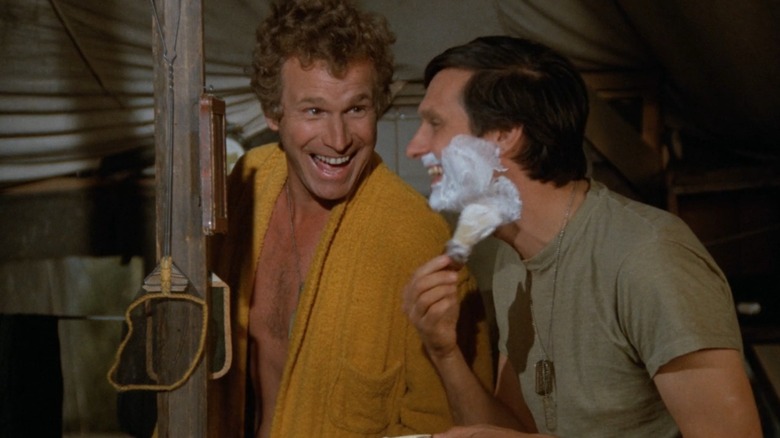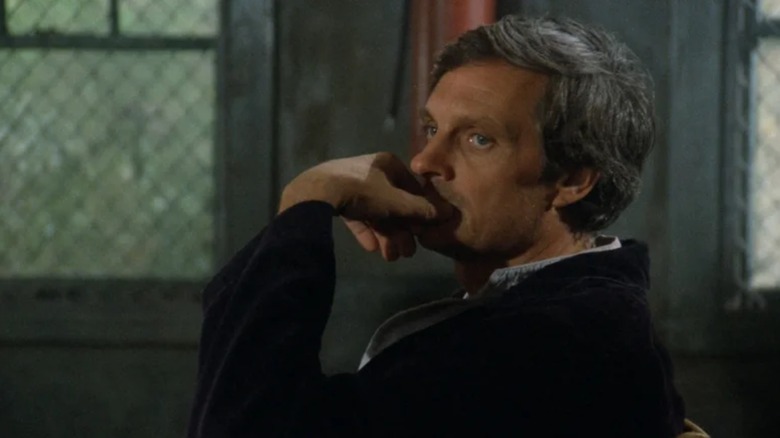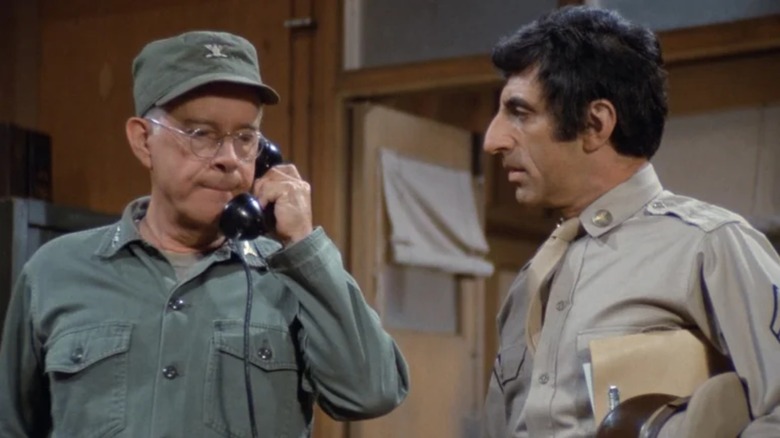The Original British Broadcast Of M*A*S*H Made One Jarring Change To The Show
When it comes to watching modern TV shows, the binge-watch process is easy: find them on streaming or cable, click, and watch. For older shows, though, there's often a catch. Either a classic sitcom won't be available on streaming, or it'll have an improper aspect ratio or degraded image, or something might be off with the sound. Classic TV fans know that sometimes, the best way to experience a show is not in syndicated reruns, where whole scenes might be cut out, songs replaced, or edits tampered with.
The '70s anti-war sitcom "M*A*S*H" is no exception. There are plenty of versions of the show floating around, but most folks who have caught up with it in the past few years may have done so via Hulu, where a crisp HD remaster makes the series feel new again. On Hulu, though, the show's aspect ratio is wacky, resulting in scenes that include additional background imagery that was never meant to be seen by audiences. Some versions of the dramedy include a laugh track (a mandated feature that creator Larry Gelbart famously hated) and others don't, while at least one infamous season three moment didn't play in reruns for years.
Many of these bugs and differences are relatively well-known among "M*A*S*H" fans, but in Ed Solomonson and Mark O'Neill's "TV's M*A*S*H: The Ultimate Guide Book," Gelbart revealed that there was an even more disruptive change to "M*A*S*H" made in the show's original broadcast days: episodes of the already-energetic series were sped up to a frantic pace.
The UK version of MASH was a little off
In a conversation with Solomonson, Gelbart spoke to the author about the popularity of "M*A*S*H" abroad, noting that it "was extremely popular in Australia" because of the country's veteran population, and that England initially "got the best of the series, because England got to see the show without the goddamned laugh track." Ever the laugh track hater, Gelbart noted that once the show appeared in reruns in the UK, "the dreaded giggle machine had been installed," but even before that, the UK version of the show was a bit, well, off. "What they did do in England, in the pre-cable days — I think I wrote about this once — they played all the episodes faster," Gelbart shared in an interview for the book.
The filmmaker said the change "has to do with different sound cycles," and that it's definitely noticeable. "I had my back to the set one day and the dialog was so fast," he explained. "It wasn't a cartoon, but it was quite different." Given the manic energy Alan Alda carries as traumatized goofball Hawkeye, I can imagine hearing the show on 1.25 speed would be really disorienting. Gelbart and Solomonson joke that it was "'M*A*S*H' on speed." Unfortunately, advancements in TV broadcast technology haven't saved classic sitcoms from incorrect pacing. As recently as two years ago, "M*A*S*H" fans on the show's Subreddit complained of alleged changed frame rates on the MeTV reruns of "M*A*S*H," which they theorized were meant to get the slightly longer-than-average show to fit into the channel's schedule — with room to spare for lots of commercials.
Syndication cuts suck
As funny as it is, "M*A*S*H" is a deeply emotional show, too, and it's frustrating to think that some of its most hard-hitting moments have been altered in several different ways across the years. Among the show's many great qualities is its strong pacing and creative use of its limited screen time, so any tampering with that screen time feels like a betrayal of the material.
Even deeper cuts have been made over the years, too, with eagle-eyed Reddit users noting bits of characterizing dialogue for Frank Burns (Larry Linville) and Charles Winchester (David Ogden Stiers) were among the shortened bits. Some of the best shows of all time, from "M*A*S*H" to "Seinfeld" to "Star Trek," have suffered from odd syndication choices, but for avid fans, this also means there are more versions of the series to seek out. In the case of "M*A*S*H," completionist fans who didn't catch the show in the U.K. have yet another version to search for: the overcaffeinated cut.


